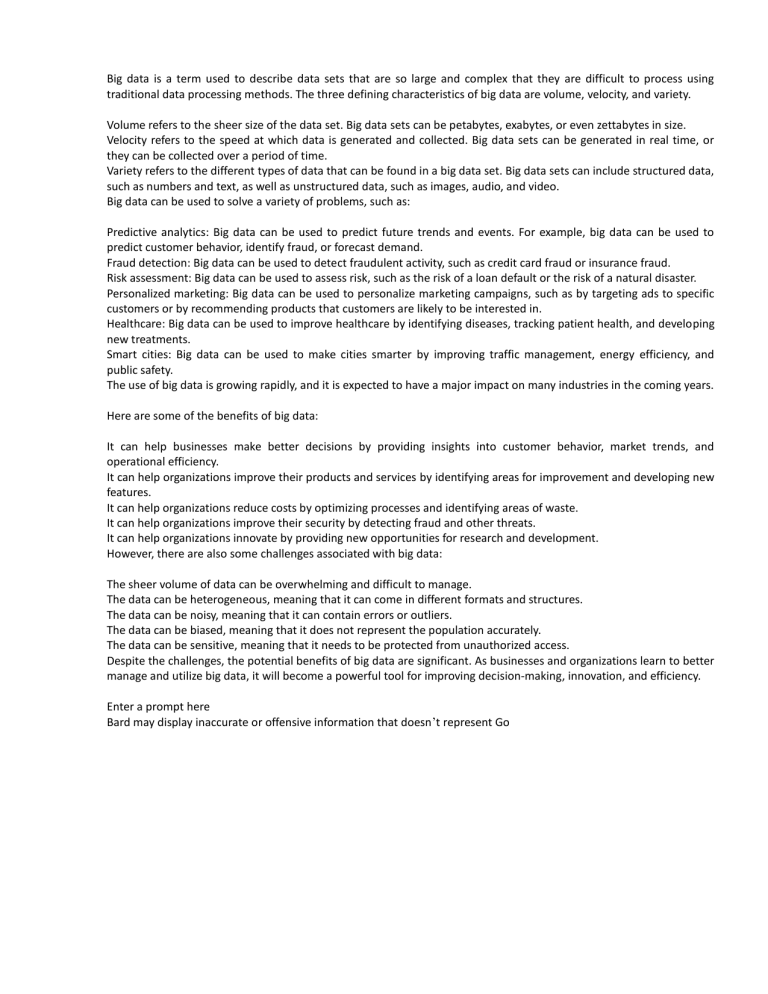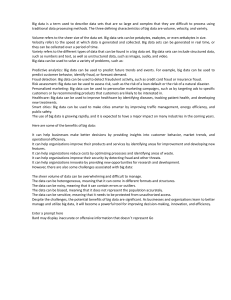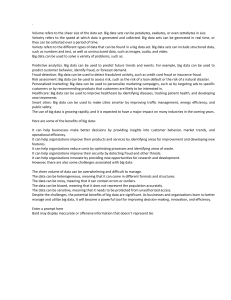
Big data is a term used to describe data sets that are so large and complex that they are difficult to process using traditional data processing methods. The three defining characteristics of big data are volume, velocity, and variety. Volume refers to the sheer size of the data set. Big data sets can be petabytes, exabytes, or even zettabytes in size. Velocity refers to the speed at which data is generated and collected. Big data sets can be generated in real time, or they can be collected over a period of time. Variety refers to the different types of data that can be found in a big data set. Big data sets can include structured data, such as numbers and text, as well as unstructured data, such as images, audio, and video. Big data can be used to solve a variety of problems, such as: Predictive analytics: Big data can be used to predict future trends and events. For example, big data can be used to predict customer behavior, identify fraud, or forecast demand. Fraud detection: Big data can be used to detect fraudulent activity, such as credit card fraud or insurance fraud. Risk assessment: Big data can be used to assess risk, such as the risk of a loan default or the risk of a natural disaster. Personalized marketing: Big data can be used to personalize marketing campaigns, such as by targeting ads to specific customers or by recommending products that customers are likely to be interested in. Healthcare: Big data can be used to improve healthcare by identifying diseases, tracking patient health, and developing new treatments. Smart cities: Big data can be used to make cities smarter by improving traffic management, energy efficiency, and public safety. The use of big data is growing rapidly, and it is expected to have a major impact on many industries in the coming years. Here are some of the benefits of big data: It can help businesses make better decisions by providing insights into customer behavior, market trends, and operational efficiency. It can help organizations improve their products and services by identifying areas for improvement and developing new features. It can help organizations reduce costs by optimizing processes and identifying areas of waste. It can help organizations improve their security by detecting fraud and other threats. It can help organizations innovate by providing new opportunities for research and development. However, there are also some challenges associated with big data: The sheer volume of data can be overwhelming and difficult to manage. The data can be heterogeneous, meaning that it can come in different formats and structures. The data can be noisy, meaning that it can contain errors or outliers. The data can be biased, meaning that it does not represent the population accurately. The data can be sensitive, meaning that it needs to be protected from unauthorized access. Despite the challenges, the potential benefits of big data are significant. As businesses and organizations learn to better manage and utilize big data, it will become a powerful tool for improving decision-making, innovation, and efficiency. Enter a prompt here Bard may display inaccurate or offensive information that doesn’t represent Go







